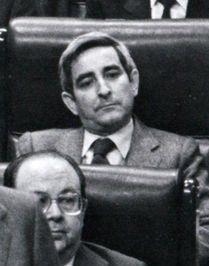Gabriel Cisneros facts for kids
Quick facts for kids
Gabriel Cisneros
|
|
|---|---|
 |
|
| Personal details | |
| Born |
Gabriel Cisneros Laborda
14 August 1940 Tarazona, Zaragoza, Spain |
| Died | 27 July 2007 (aged 66) Murcia, Spain |
| Political party | Union of the Democratic Centre, Liberal Party, People's Party |
| Occupation | Attorney Politician |
Gabriel Cisneros Laborda (born August 14, 1940 – died July 27, 2007) was a Spanish lawyer and politician. He is best known for being one of the important people who helped create the Spanish Constitution of 1978. This constitution set up Spain's modern democratic government. He also helped write the European Union's Declaration of Human Rights, which protects people's basic freedoms.
Contents
Creating Spain's Constitution
Gabriel Cisneros was one of seven politicians chosen to write the Spanish Constitution of 1978. This was Spain's very first democratic constitution, or set of rules for how the country would be run. It was created after the death of Francisco Franco in 1975, who had ruled Spain as a dictator. The new constitution became the foundation for the Spanish Government from 1978 until today. Cisneros also wrote several other important Spanish laws.
Working on Basque Laws
Cisneros also helped create laws for the Basque region of Spain. These laws gave the Basque region more self-governance. Because of his work on these laws, Cisneros became a target for a group called ETA. This group wanted the Basque Country to be completely independent.
In 1979, Cisneros survived a kidnapping attempt by ETA. He bravely fought off two kidnappers and managed to escape. He was injured during the attempt but recovered.
His Political Journey
Cisneros was a member of a political group called the Union of the Democratic Centre (UCD). In 1979, he was elected to the Spanish Congress of Deputies, which is like Spain's parliament. He represented the area of Soria.
He kept his seat in the 1982 election. However, the UCD party lost many seats and later broke up in 1983. After that, Cisneros served as an independent politician. He took a break from politics in 1986 but returned in 1988, joining the Liberal Party.
In 1989, the Liberal Party joined with other groups to form the Partido Popular (PP). This is a major conservative political party in Spain today. Cisneros was elected back into the Spanish Congress in 1989 as a PP representative for Burgos. He was re-elected in 1993 and 1996. In 2000, he was elected to represent Zaragoza and served there until he passed away in 2007.
As an MP, Cisneros held several important positions. From 1981 to 1982, he was the Secretary of State for Relations with the Cortes. This role involved managing relationships between the government and the parliament.
Honored for His Work
In July 2007, Cisneros made his last appearance in the Cortes Generales (Spain's parliament). This was for a special event celebrating 30 years since Spain's first democratic elections in 1977. King Juan Carlos honored Cisneros and other key people who helped Spain become a democracy after Franco's rule. The King said that these reformers helped Spain avoid difficult conflicts and develop its political life peacefully.
His Passing
Gabriel Cisneros died on July 27, 2007, in Murcia. He passed away due to health problems after a stroke. His death was announced in the Spanish Parliament on the same day.
Tributes and Recognition
Many people spoke highly of Gabriel Cisneros after his death. Mariano Rajoy, who was the leader of the opposition PP at the time, called Cisneros "an extraordinary politician." The governing Socialist Party also praised him, saying he "contributed in an important way to the consolidation of our democratic system." This shows how respected he was across different political groups in Spain.
See also
 In Spanish: Gabriel Cisneros para niños
In Spanish: Gabriel Cisneros para niños

